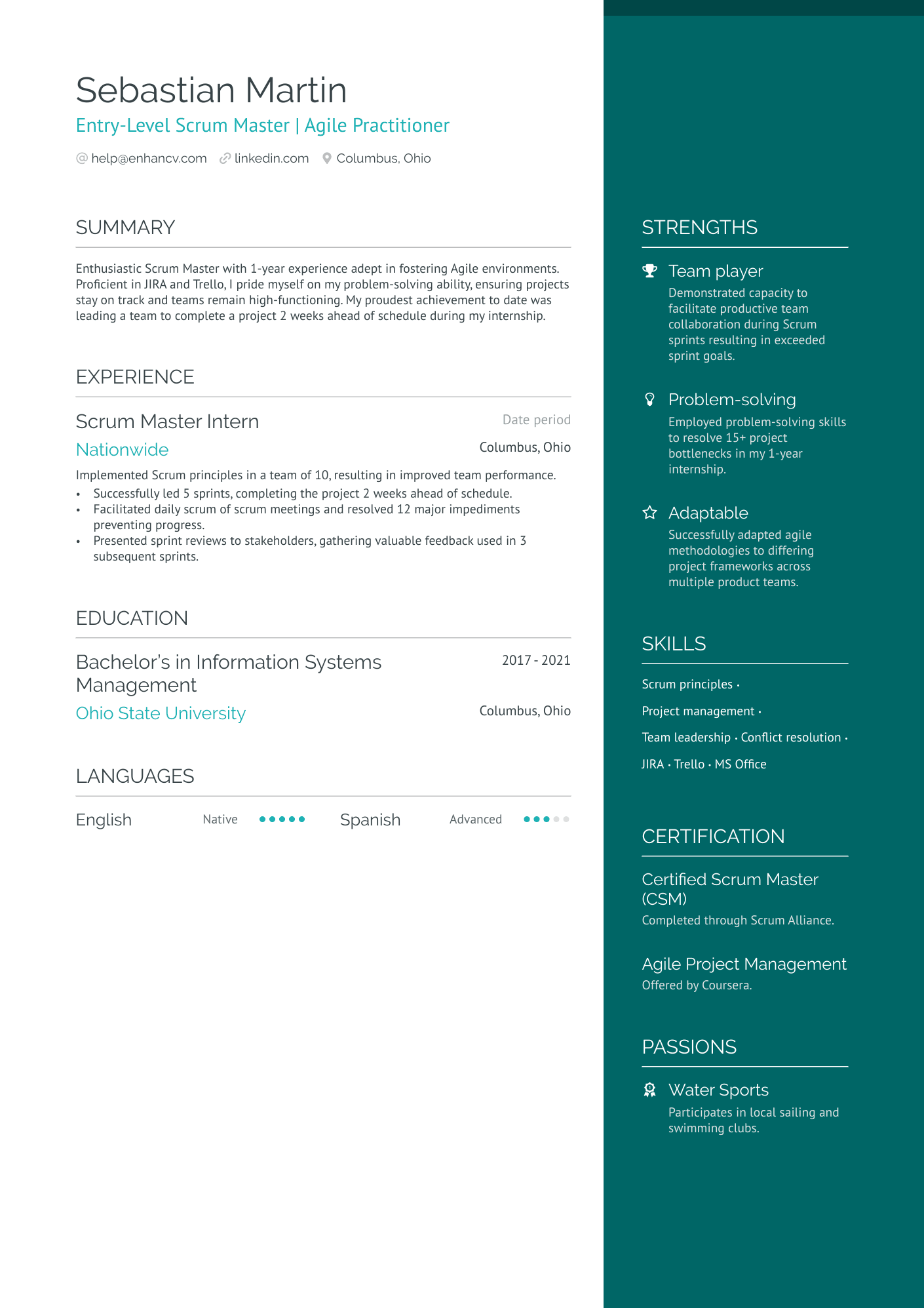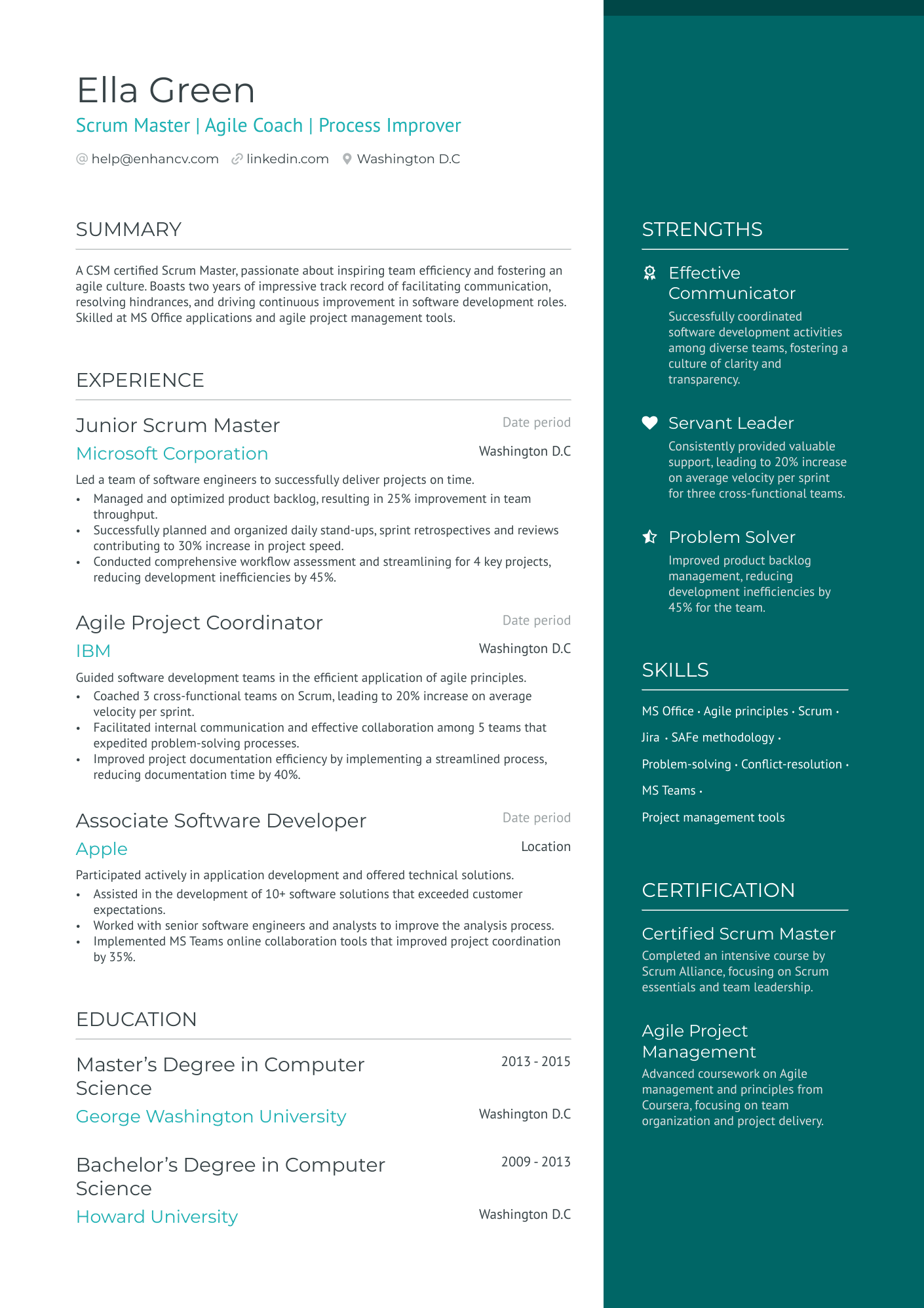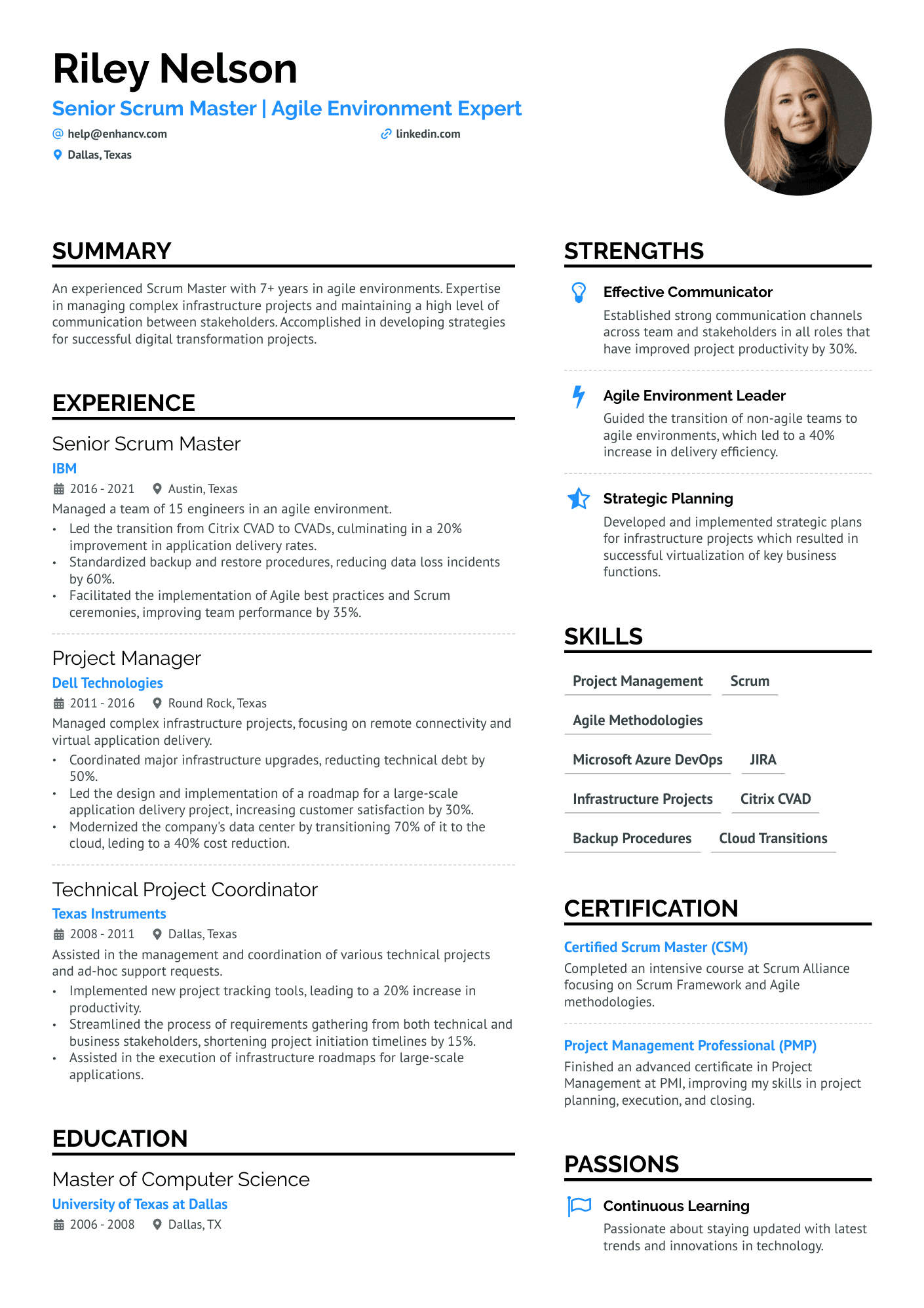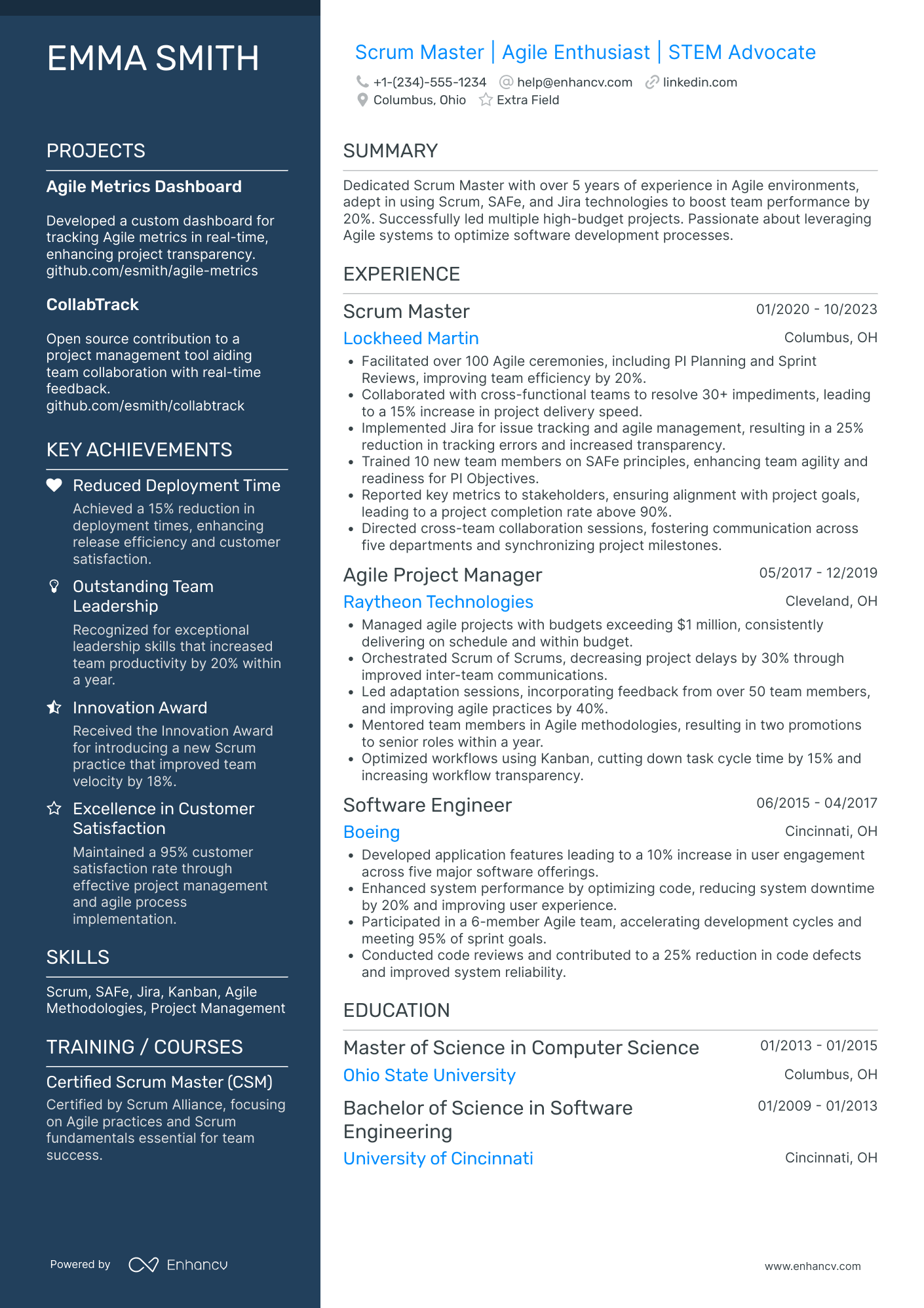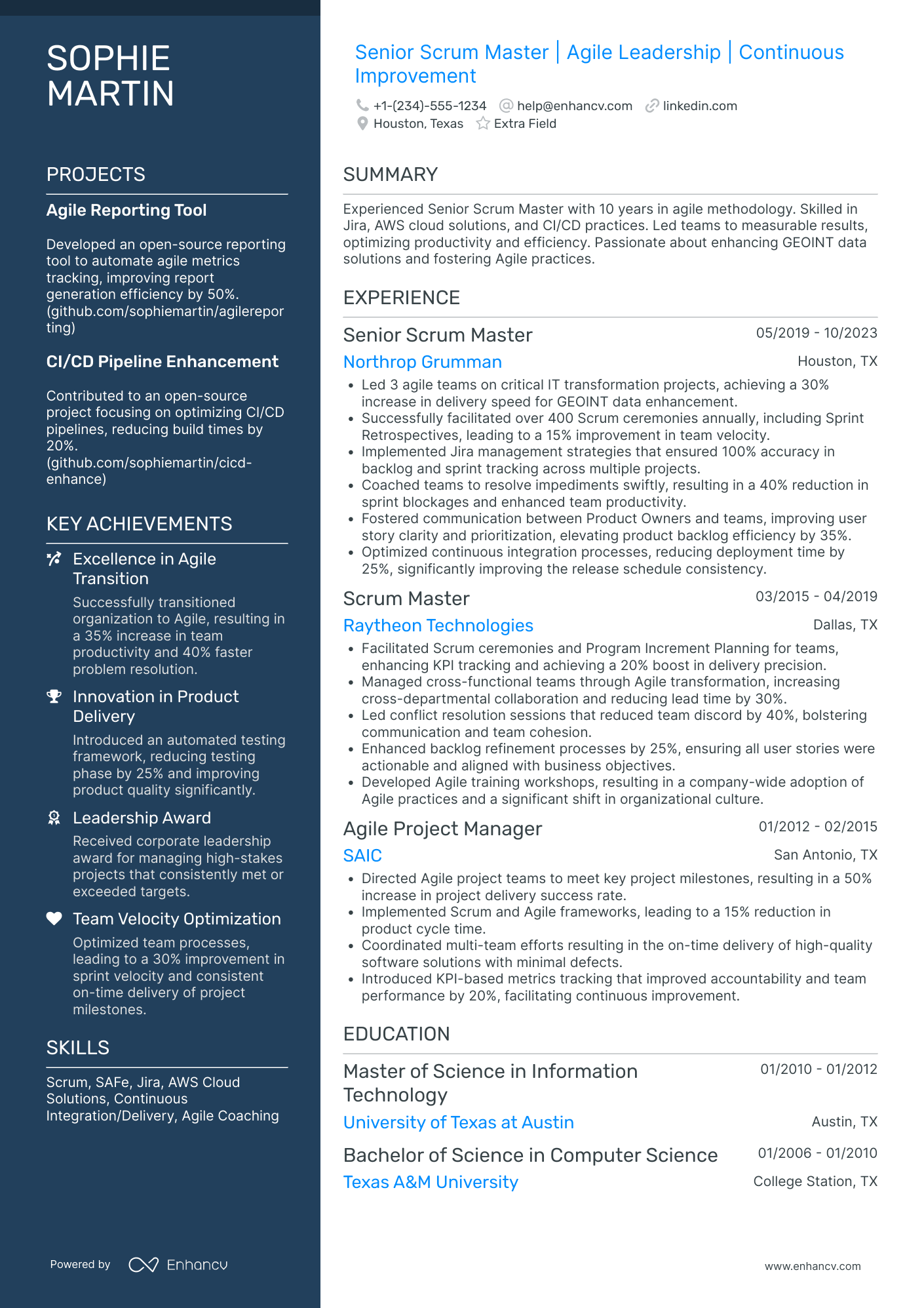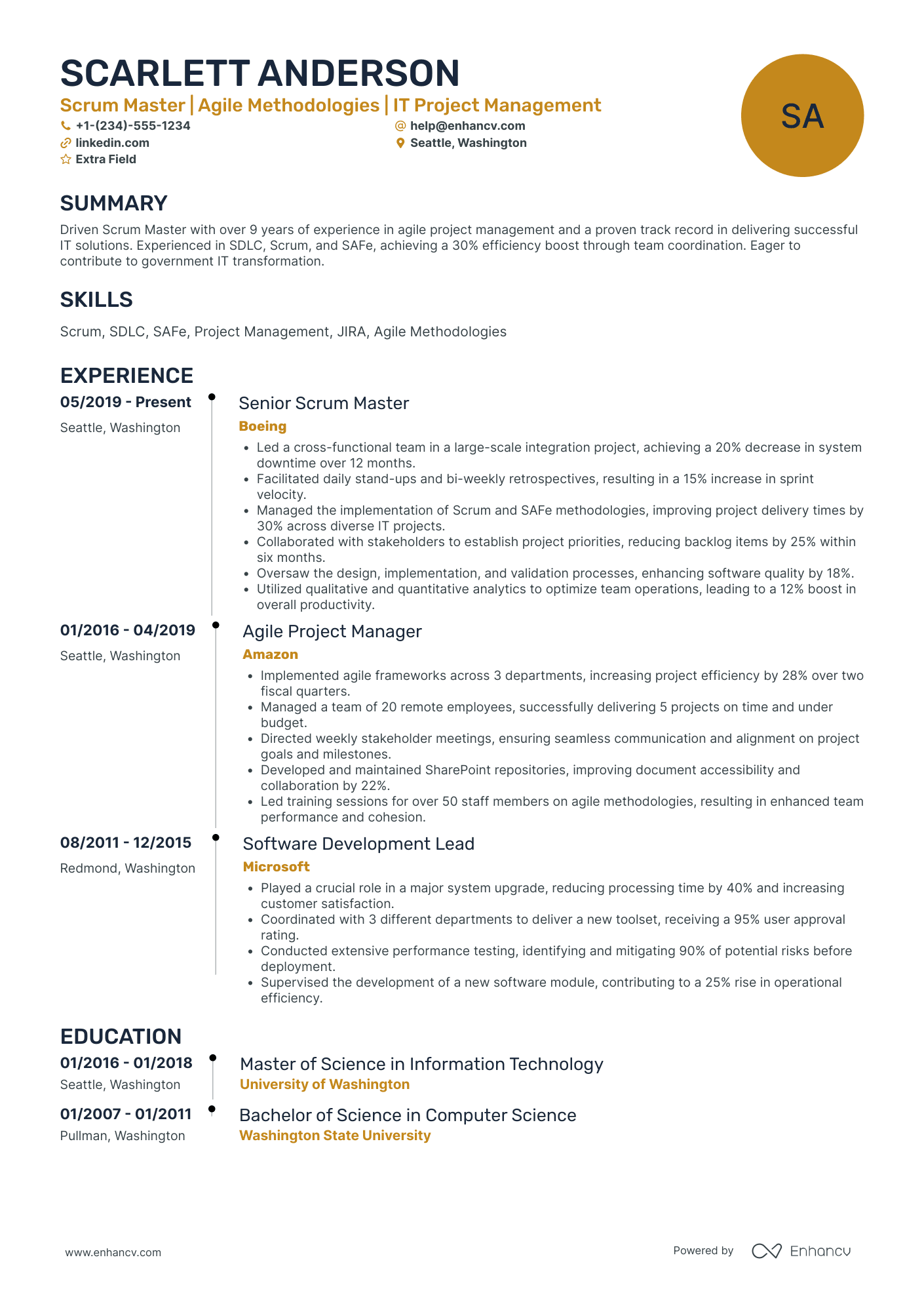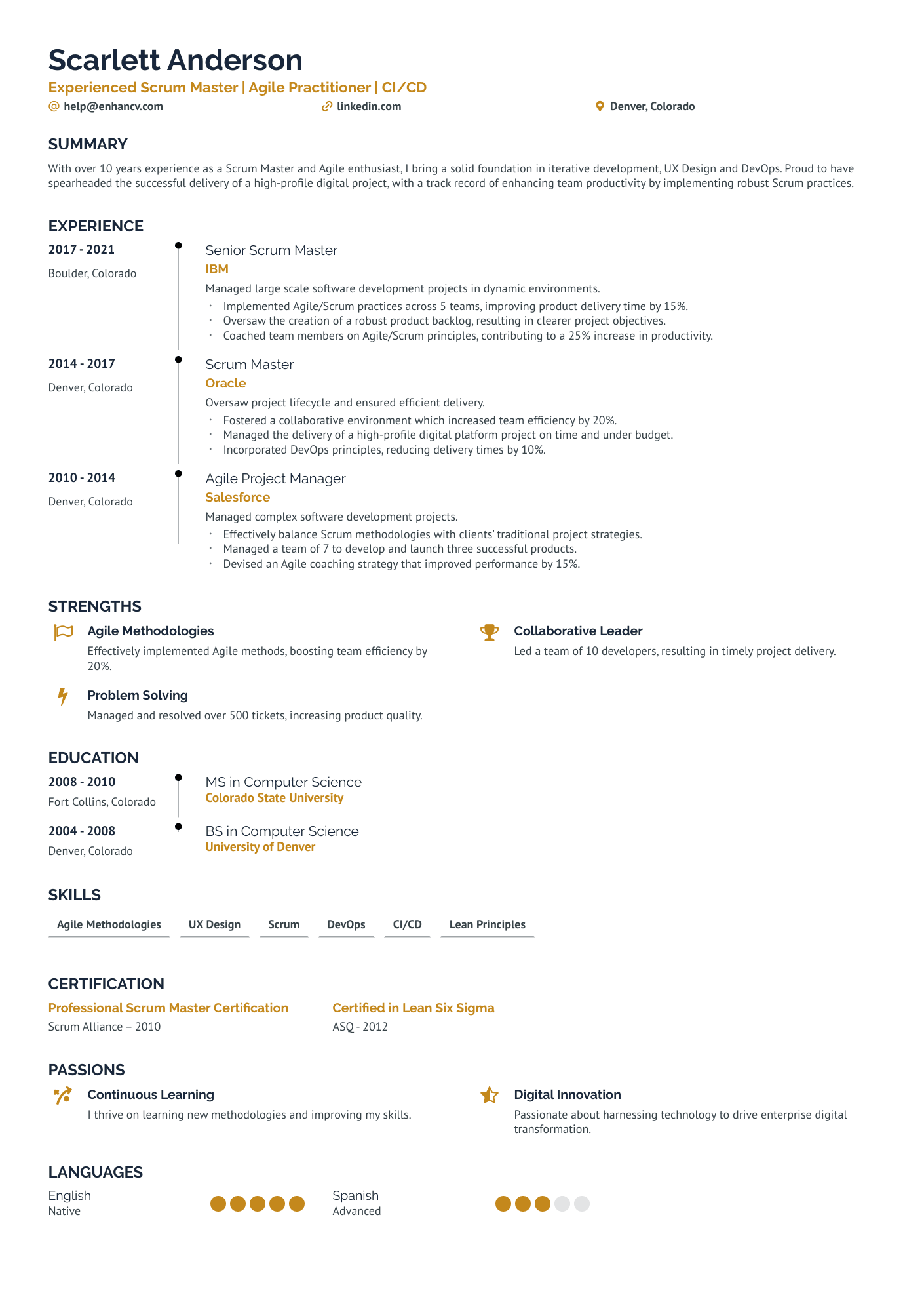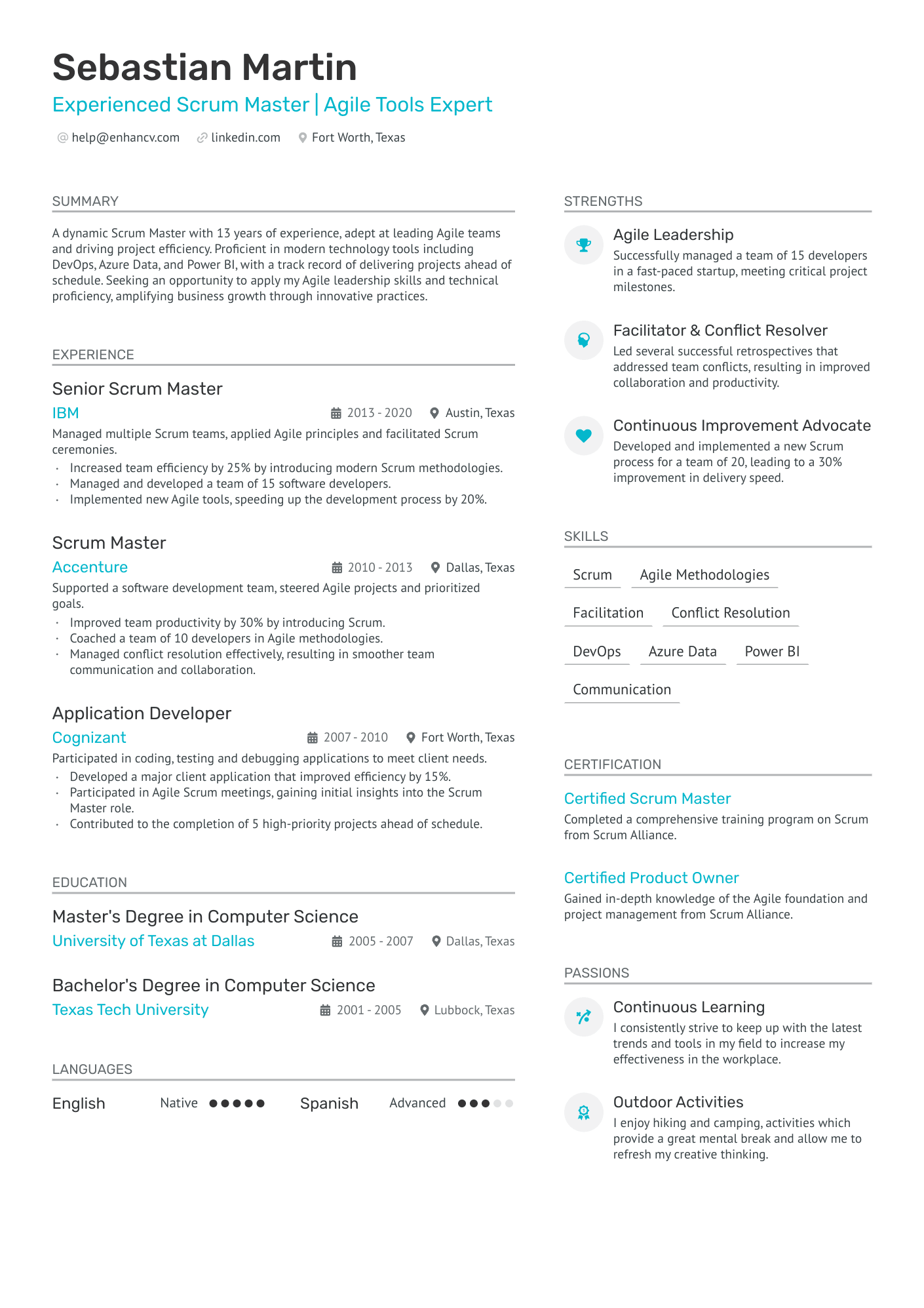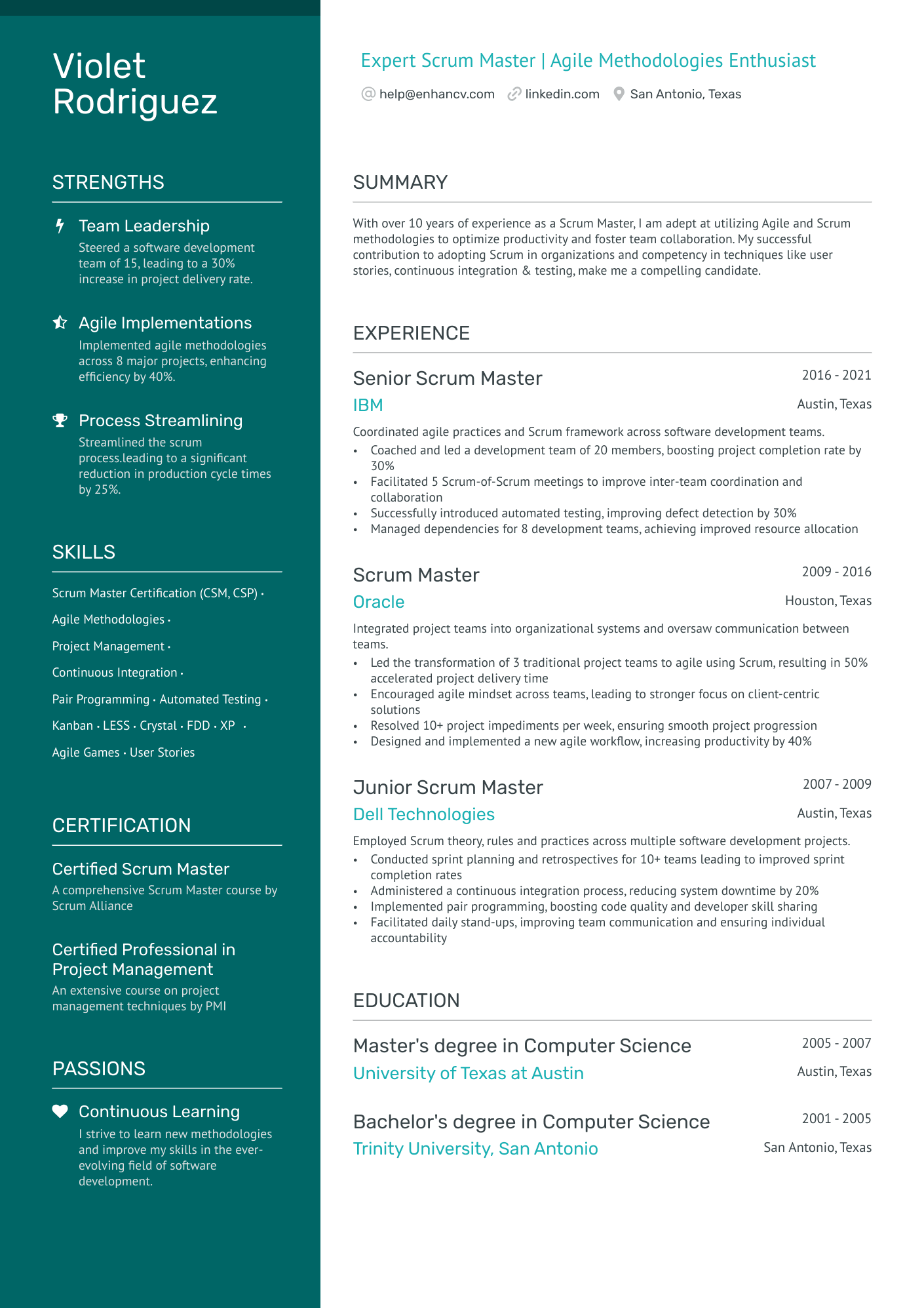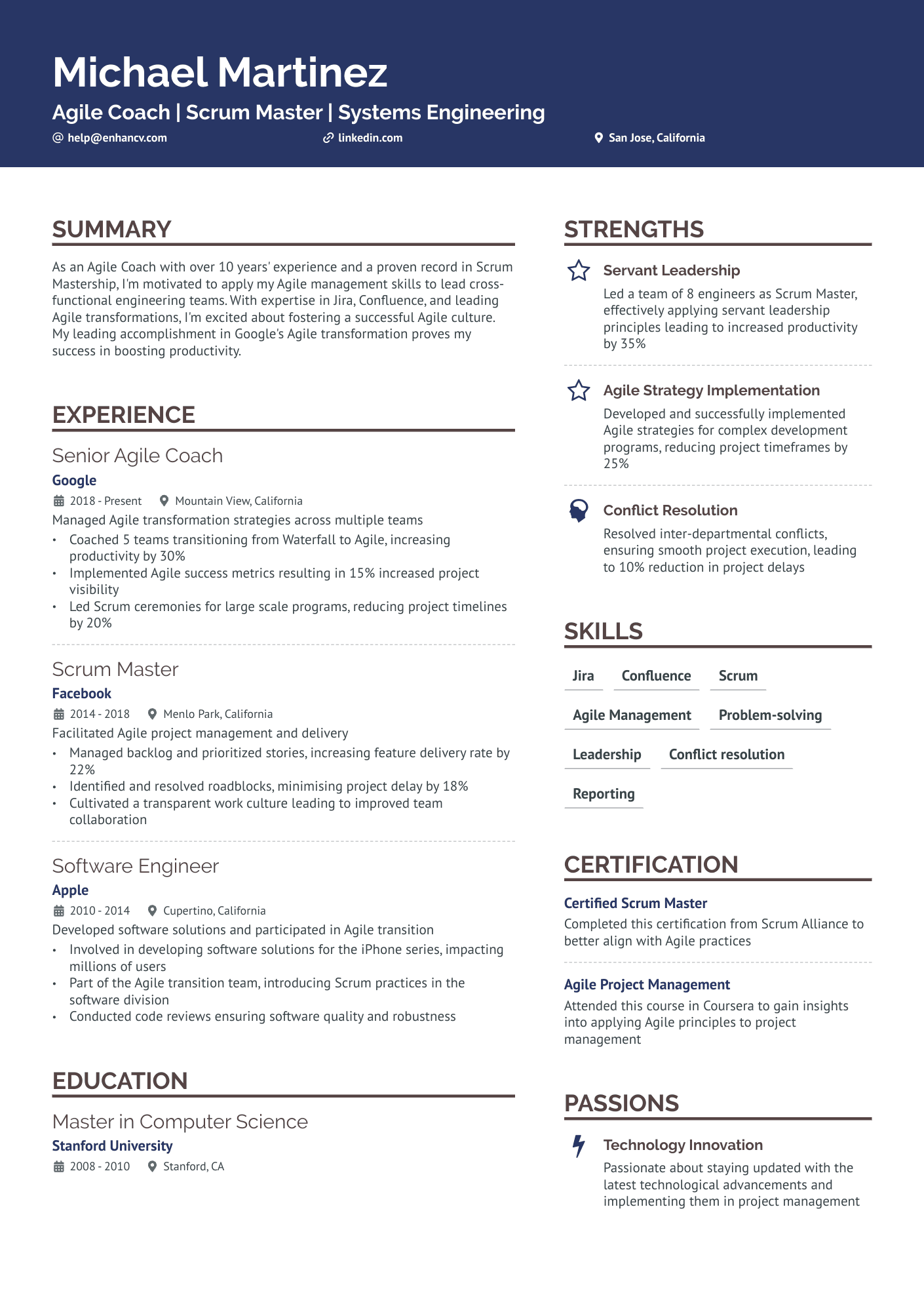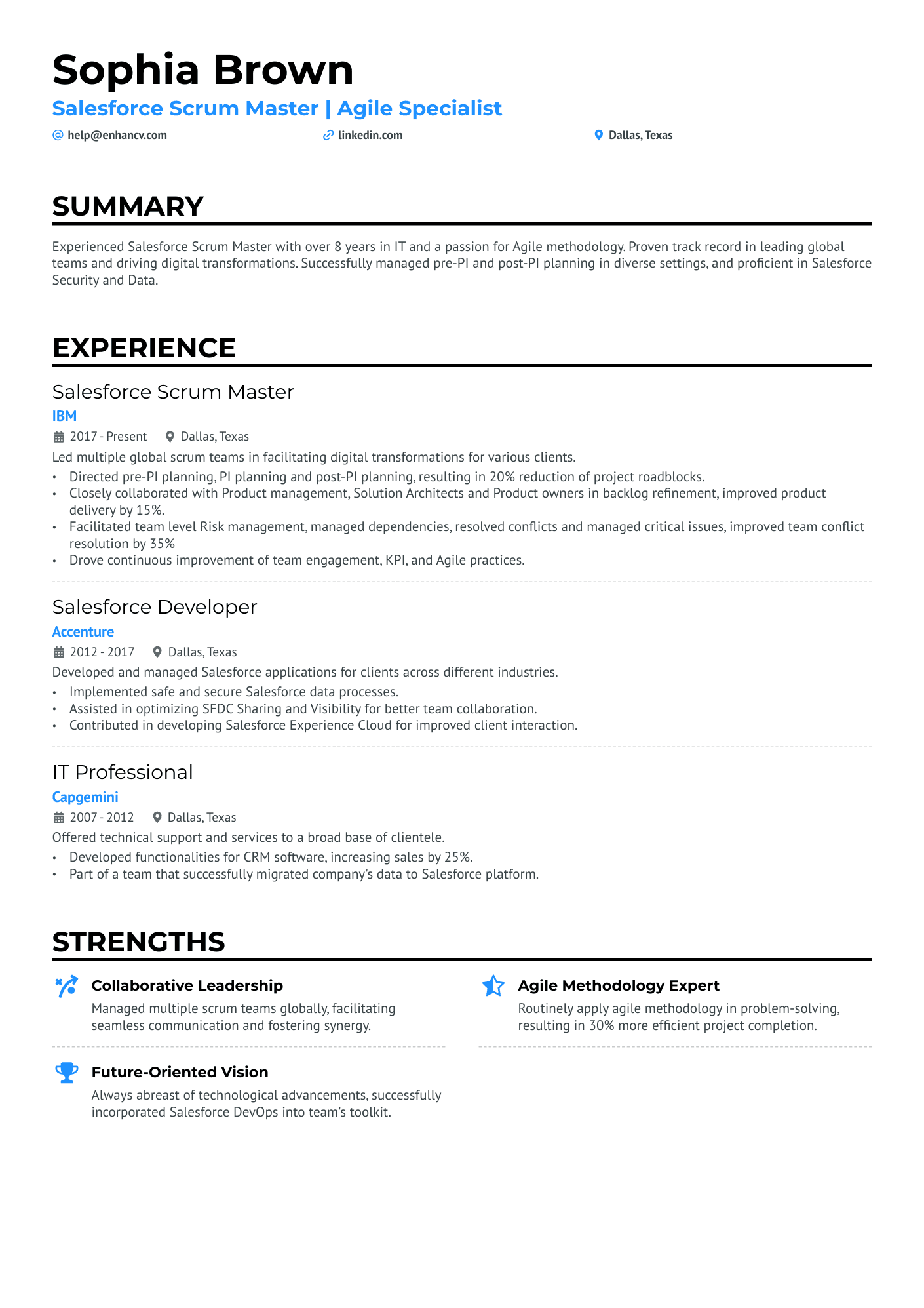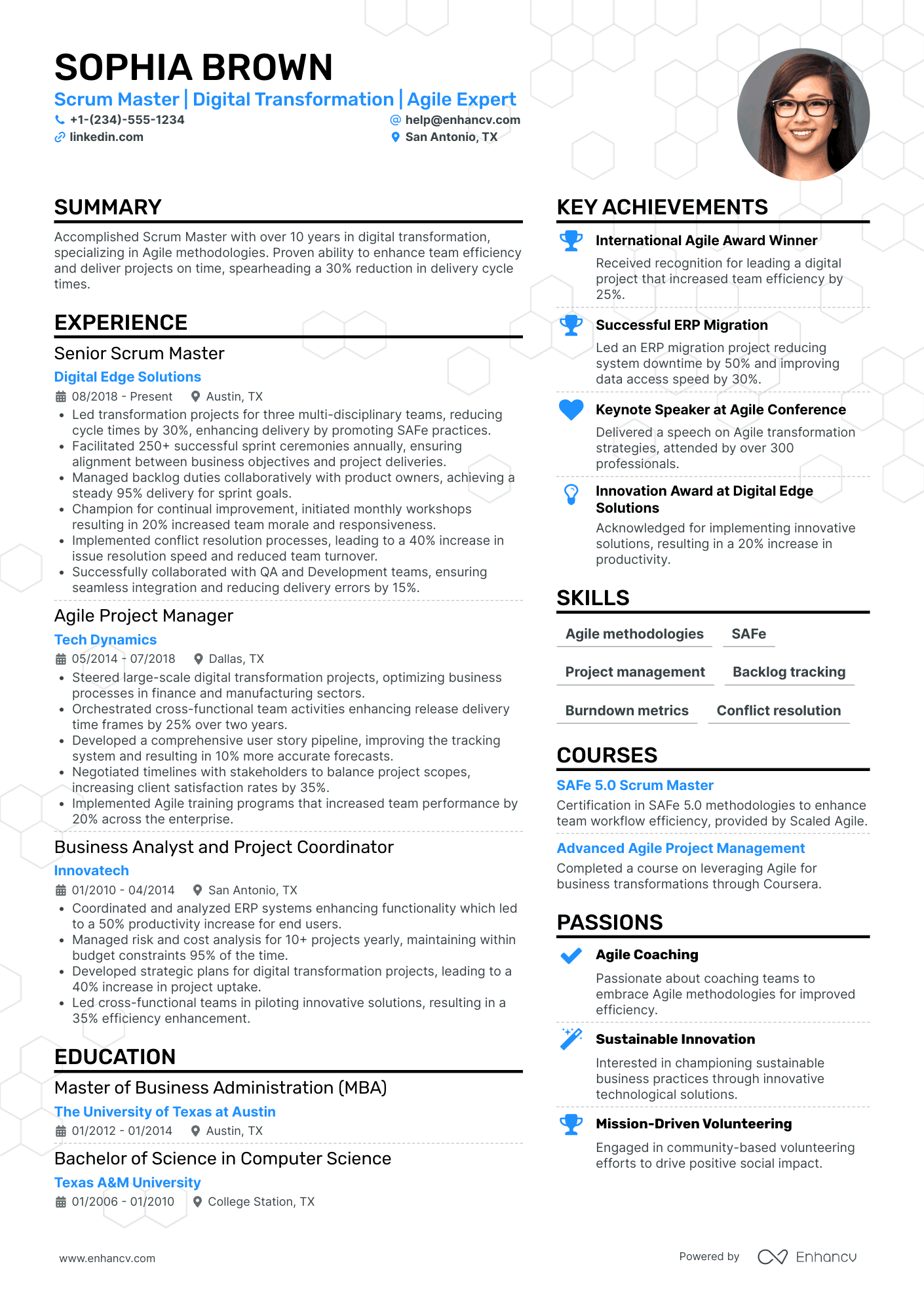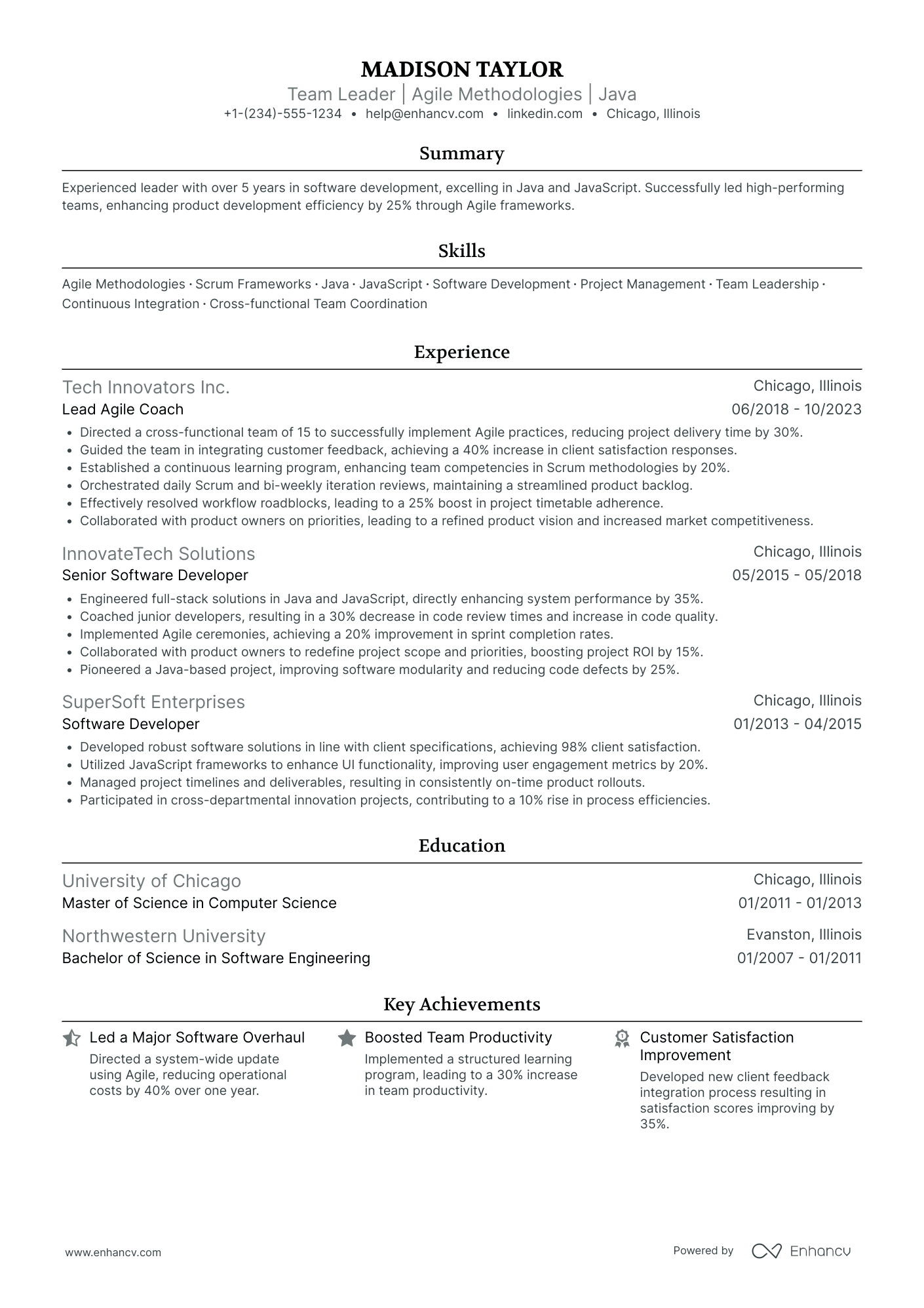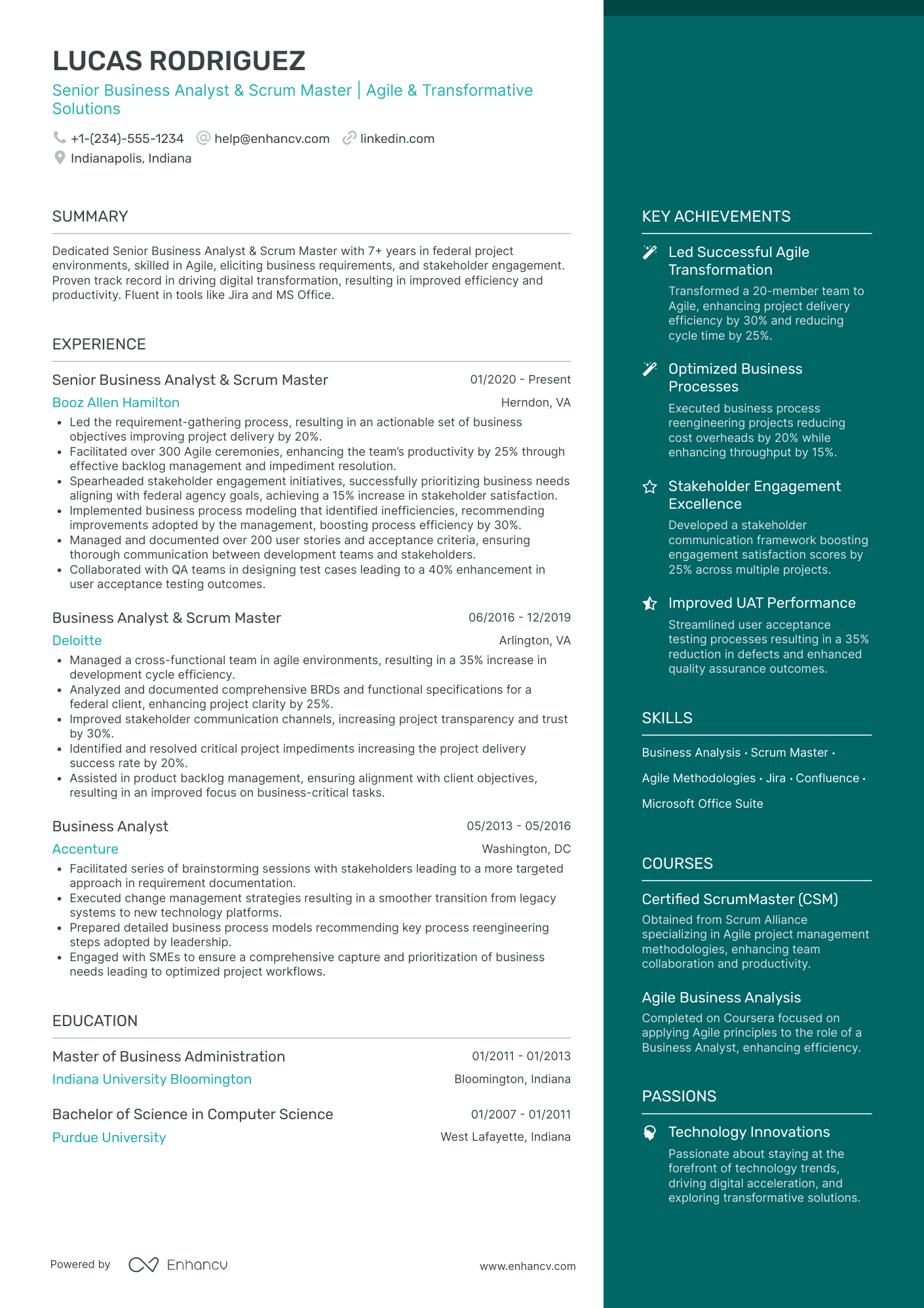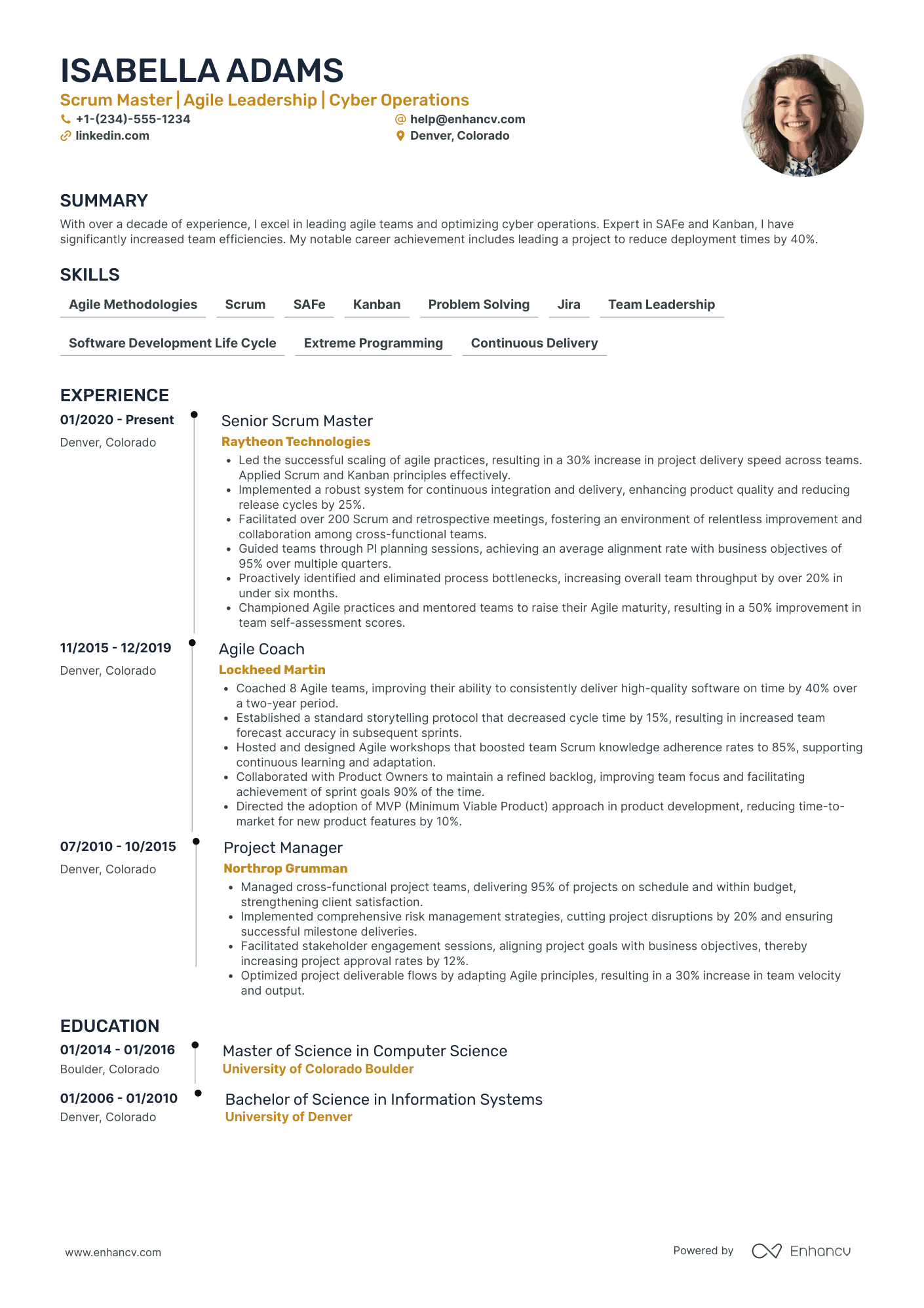Writing a resume for a scrum master position is much like orchestrating a successful sprint—both require precision, clarity, and a strategic approach. As the agile movement continues to gain momentum, the demand for skilled scrum masters is skyrocketing. In fact, a recent study revealed that 58% of organizations use Scrum, making it the most popular Agile framework.
Crafting a standout resume in this competitive field can be a daunting task, akin to herding cats during a sprint planning session. However, with the right guidance, you can transform this challenge into an opportunity.
Whether you're a seasoned scrum professional or a newcomer eager to facilitate agile transformations, this guide will help you create a resume that showcases your ability to lead teams, manage backlogs, and deliver exceptional results.
So, let's leap towards your next career milestone!
Key takeaways
- Use the reverse chronological format to detail your work experience and career progression.
- Include your degree, institution's name, location, graduation year, and honors (e.g., cum laude) in your education entry.
- Highlight relevant certifications if you have more than just a couple in a separate section.
- Quantify achievements with metrics to demonstrate impact in work experience entries.
- A resume summary should provide quantifiable achievements, relevant skills, and be tailored to the job offer.
- List hard skills like Agile methodologies and tools (e.g., Jira, Confluence) in a Skills section.
- Integrate soft skills, like leadership and communication, throughout your resume.
- Detail specific projects where you implemented Agile practices in an additional section.
Now, let’s check out a sample scrum master resume before discussing the essential formatting tips to make yours one of a kind.
Scrum Master Resume Sample
Below you can find a basic example of what your scrum master resume should look like for an experienced candidate.
Jennifer Haley
scrum master
jennifer.haley@enhancv.com Jen.Haley@LinkedIn Chicago, IL
Summary
Highly skilled and certified scrum master with extensive experience in Agile methodologies, project management, and team leadership. Proven track record of enabling the delivery of strategic product MVPs and fostering a cohesive, high-performing team environment. Adept at facilitating Agile ceremonies, mitigating risks, and driving continuous improvement. Passionate about innovation and committed to achieving organizational goals through strategic alignment and effective collaboration.
Experience
Innovation scrum master
Plethora Digital – Chicago, IL
08/2020 – Present
- Enabled delivery of strategic physical product MVPs within the assigned strategic platform.
- Facilitated the adoption of Agile approaches, standard methodologies, and tools.
- Partnered with Product Owner and cross-functional POD to deliver incremental value.
- Removed impediments for the team and shielded them from external distractions.
- Led and managed all Scrum-related activities to build a pipeline of disruptive innovation products.
- Coordinated and facilitated all Agile ceremonies for the assigned POD.
- Guided and coached teams on Agile principles, enhancing their understanding and application.
- Identified and managed risks, developing contingency plans to ensure results.
- Acted as an ambassador of Agile methodologies, tools, and processes to foster broader adoption.
- Led product commercialization activities to deliver MVPs to the market.
Agile Project Manager
Peril, Inc. – Chicago, IL
03/2017 – 06/2020
- Managed multiple Agile projects from inception to completion.
- Facilitated Agile ceremonies and coached teams on Agile best practices.
- Collaborated with cross-functional teams to ensure project alignment with business objectives.
- Monitored project progress and performance, providing regular updates to stakeholders.
- Implemented continuous improvement initiatives to enhance team efficiency and productivity.
Education
Bachelor of Science in Computer Science
University of Illinois at Chicago
Graduated: 2016
- Relevant coursework: Agile Software Development, Project Management, Systems Analysis and Design, Data Structures, Software Engineering Principles
- Honors and achievements: Dean’s List (4 semesters)
Certifications
- Certified scrum master (CSM)
- SAFe 6.0 Certification
Skills
- Agile Methodologies (Scrum, SAFe, Kanban)
- Project Management
- Team Leadership and Coaching
- Risk Management
- Product Commercialization
- Jira, Confluence, Miro
- Strategic Planning and Execution
- Conflict and Change Management
Languages
- English (Fluent)
- Spanish (Conversational)
How to Format a Scrum Master Resume
Creating a well-structured and professional resume layout is crucial for grabbing the attention of recruiters as a scrum master. This section will guide you through the best practices for resume formats, ensuring it meets industry standards and effectively puts the spotlight on your skills and experience.
Accepted resume format
- Reverse chronological format: This format is the most accepted for a scrum master role, emphasizing your work experience and career progression.
Resume designs
- Keep resume margins between 0.5 to 1 inch to ensure readability.
- Use professional colors, primarily black and white, with minimal use of accent colors for headings.
- Choose clean, professional fonts like Arial, Calibri, or Times New Roman, sized 10 to 12 points.
- Use a double-column resume layout to maintain clarity and ease of reading.
- Aim for a one-page resume, but two pages are acceptable if you have extensive experience.
Resume header
- In your resume header be sure to give your contact information, including your city and state, but omit the full address for privacy.
- Provide a professional email address, LinkedIn profile, and personal website or portfolio if relevant.
- Generally, avoid including a photo unless explicitly requested or relevant to the job market in your country.
- Include a concise resume headline that summarizes your professional identity and highlights your primary strengths.
File formatting
- Save your resume as a PDF to preserve formatting.
- Use “FirstNameLastNameResume.pdf” naming convention for clarity and professionalism.
Here are the top resume sections of your scrum master application:
- Summary
- Experience
- Education
- Certifications
- Skills
- Languages
Think about the market’s preferences – a Canadian resume, for instance, could have a different layout.
ATS (Applicant Tracking Systems)
These ATS systems often generate unnecessary concerns. Contrary to common belief, our evaluations indicate that fonts, colors, columns, and resume length do NOT impact the parsing process.
Instead, emphasize aligning your resume's language with the job description and ensuring details like dates and bullet points are correctly formatted, as these elements may affect your application. However, not all companies utilize ATS, so avoid keyword stuffing and maintain a clear, readable resume.
With your resume format in place, let's explore creating a compelling work experience section that demonstrates your scrum master skills and achievements.
How to Write Your Scrum Master Resume Experience
Listing work experience on a scrum master resume is crucial as it provides your practical expertise, impact on previous roles, and ability to apply Scrum methodologies effectively. This section underlines your contributions to team success and project outcomes, providing clear evidence of your skills and achievements, making your application compelling.
Importance of tailoring a resume to specific job postings
Tailoring your resume is essential because it illustrates your relevant skills and achievements, making you a stronger candidate and increasing your chances of securing the position. Utilize keywords on your resume from the job description and reuse them throughout your application. This alignment shows that you understand the job requirements and are well-suited for the role.
Here’s why:
- Aligns with employer needs
- Demonstrates fit
- Enhances relevance
- Boosts interview chances
Below is an actual job offer for a scrum master.
Innovation scrum master
Position Overview:
As Innovation scrum master you will enable delivery of strategic physical product MVPs within the assigned strategic platform. You will facilitate the adoption of the Agile approach, standard methodologies, and tools.
You will support and partner with the Product Owner and cross-functional POD in delivering incremental value (strategic portfolio pipeline, consumer findings, NSV opportunities, and MVPs) to supply substantial NSV generation to the organization. You are well versed in Scrum methodology and can educate others on Agile methodologies and practices. You will remove impediments for the team and act as a shield from external distractions. Key to the Innovation scrum master role is to create a cohesive and engaging environment for the team, constantly seeking continuous improvement and building higher-performing teams.
Role and Responsibilities:
- Lead and run all Scrum-related activities for PODs to build a pipeline of disruptive innovation products and/or other Agile teams.
- Coordinate and facilitate all Agile ceremonies for the assigned POD.
- Guide and coach teams and develop their understanding and application of Agile principles
- Use experience and judgment to appropriately identify and optimally manage risks developing contingency plans to resolve, focusing on achieving results, and setting ambitious goals.
- Provide insight into the health of the POD's ability to deliver strategic OKRs and KPIs against the goals.
- Ensure execution is aligned with strategy by working with business and product leaders.
- Act as an ambassador of Agile methodologies, tools, and processes to grow adoption across KHC.
- Flag issues/risks and other key actions that may need to collaborate with non-Agile portions of the company.
- Lead and activate product commercialization activities to deliver MVPs to the market.
- Identify trade-offs between short- and long-term benefits to drive shared vision between the team and product owner.
- Foster a continuous learning environment helping teams to inspect & adapt.
- Facilitate large group discussions.
- Display strong analytical and leadership skills, including conflict & change management.
- Demonstrated ability to work in a highly collaborative environment with a heavy emphasis on teamwork.
Requirements & Minimum Qualifications:
- Relevant work in Agile and Scrum.
- Experience with project and program management, methods, and techniques, including but not limited to Agile, Scrum, and Waterfall.
- Ability to influence, working with technical and cross-functional or highly matrixed teams.
- Exceptional organization, communication, and time management skills. Ability and comfort with routinely communicating with project owners and executive sponsors regarding project/program status.
- Ability to promote innovative thinking and self-improvement within the team.
- Confident and skilled at guiding the team through organizational roadblocks to allow Sprints to be completed on time.
- Scrum master certification and any SAFe 6.0 certifications are a plus.
- Design Thinking Certifications are a plus.
- Experience with Jira and Confluence, Miro, or other story-tracking/whiteboarding tools is a must.
How to write a work experience entry on a scrum master resume
When writing a work experience entry for a scrum master resume, follow these guidelines:
Job title and company
- Mention your job title, the company’s name, and the dates of employment.
Achievements and responsibilities
- List your key responsibilities and achievements using concise bullet points.
- Quantify your achievements with metrics where possible to demonstrate impact.
Key elements
- Clearly state your role and the organization you worked for.
- Include the month and year of your start and end dates.
- A brief overview of your primary responsibilities.
- A concise summary of the company if it’s a relatively unknown one.
- Specific accomplishments that highlight your success in the role using action verbs and quantifying metrics.
- Write any specific Agile tools (e.g., Jira, Confluence) and methodologies you applied.
PRO TIP
Your work experience shouldn’t go further back than 10-15 years, focusing on relevant roles that display your skills and achievements. This ensures your resume remains concise and impactful.
Here’s an example of a work experience entry targeting the job ad from above:
- •Led all Scrum-related activities for PODs, building a pipeline of disruptive innovation products, resulting in a 30% increase in project completion rate.
- •Coordinated and facilitated all Agile ceremonies, including daily stand-ups, sprint planning, and retrospectives, reducing sprint cycle time by 15%.
- •Removed impediments and acted as a shield from external distractions, improving team productivity by 20% and fostering a cohesive and high-performing team environment.
- •Guided and coached teams on Agile principles and methodologies, promoting continuous improvement, which led to a 25% increase in team velocity and effective application of Agile practices.
Here’s how the entry has been tailored:
- Delivery of strategic physical product MVPs: Highlighted in the overview and first bullet point, focusing on enabling delivery and building a pipeline of disruptive products.
- Facilitating the adoption of the Agile approach: Emphasized in the overview and last bullet point, showcasing coaching and guiding teams on Agile principles.
- Support and partner with the Product Owner and cross-functional POD: Shown through coordinating Agile ceremonies and improving team productivity.
- Substantial NSV generation: Indicated in the overview, aligning with delivering incremental value and strategic portfolio pipeline.
- Removing impediments and shielding the team: Directly targeted in the third bullet point, showing how external distractions were managed to boost productivity.
- Creating a cohesive and engaging environment: Demonstrated in multiple points, especially the last two, focusing on team cohesion, coaching, and continuous improvement.
You can spot several examples of quantifying your experience in this section—now, let's look deeper into this crucial aspect.
How to quantify your experience on a resume
Using numbers and results on a resume provides concrete evidence of your achievements and impact, making your contributions more compelling to employers. To quantify them properly, use specific metrics such as percentages, dollar amounts, or numerical improvements.
Now that you've learned how to quantify your achievements, let's move on to describing the essential skills that make you an outstanding scrum master.
How to List Your Hard and Soft Skills on Your Resume
Demonstrating your skills on a scrum master resume puts an emphasis on your ability to effectively lead teams, manage projects, and facilitate Agile methodologies. They prove both your technical proficiency and interpersonal capabilities, which are essential for successfully driving project outcomes and fostering team collaboration.
Hard skills vs. soft skills
- Hard skills: These are specific, teachable abilities or knowledge sets that are quantifiable and often verified through certifications and experience.
- Soft skills: These are interpersonal attributes and behaviors that enhance your ability to work well with others, demonstrated through interactions and experiences. These are often transferable skills that can be essential across different industries.
A great Scrum Master helps the team with what they need, not necessarily with what they want.
Henrik Kniberg, prominent Agile and Lean coach, consultant, and author
Hard skills for a scrum master resume
Hard skills on your resume display your technical expertise. Include these in a skills section, ensuring they align with the job description for relevance and visibility to hiring managers and systems.
Here’s a comprehensive list of the most sought-after hard skills for scrum masters.
Best hard skills for your scrum master resume
- Jira
- Confluence
- Trello
- Asana
- Microsoft Project
- Monday.com
- Miro
- Slack
- Zoom
- Microsoft Teams
- GitHub
- GitLab
- Jenkins
- Docker
- Kubernetes
- Azure DevOps
- AWS
- Rally
- VersionOne
- Bitbucket
Soft skills for a scrum master resume
Soft skills highlight your interpersonal abilities and should be seamlessly integrated throughout your resume—in the summary, objective, work experience, and education sections—to provide context and demonstrate practical application. This approach ensures they aren’t isolated in a single section but showcased effectively.
Here are the top essential skills for your next application.
Best soft skills for your scrum master resume
- Communication
- Leadership
- Conflict resolution
- Problem-solving
- Adaptability
- Team collaboration
- Time management
- Decision-making
- Coordinating
- Engagement
- Empathy
- Negotiation
- Critical thinking
- Organizational skills
- Active listening
- Motivation
- Interpersonal
- Persuasion
- Work under pressure
Now that you've outlined your key skills, let's move on to providing your educational background and certifications, essential for establishing your expertise as a scrum master.
How to List Your Certifications and Education on Your Resume
Including an education section on your scrum master resume establishes foundational knowledge and credibility. It demonstrates your commitment to learning and highlights relevant degrees and coursework tailored to the job offer.
- Degree earned (major and minor)
- Institution's name
- Location
- Graduation year
- GPA (optional and only if it’s 3.5 or above)
- Honors (e.g., cum laude, Dean's List)
- Relevant coursework and achievements
Below is an example of an education entry tailored to the scrum master job ad mentioned above.
- •Honors: Dean’s List (6 semesters)
- •Relevant coursework: Agile Software Development, Project Management, Systems Analysis and Design, Data Structures, Software Engineering Principles
- •Achievements: Led a team project developing a strategic product MVP using Agile methodologies, resulting in a 20% increase in project efficiency.
This education entry demonstrates a strong foundation in computer science, relevant honors, and practical achievements aligned with the responsibilities and requirements of the Innovation scrum master role.
Certifications and licensure
Certifications on your resume validate your expertise in Agile methodologies and commitment to professional development, distinguishing you from other candidates.
It’s advisable to have separate sections for certifications and licensure to ensure clarity and highlight the breadth of your qualifications. Each certification entry should include the certification name, issuing organization, and date obtained, while licensure entries should provide the license name, issuing body, and expiration date if applicable.
Here’s a list of the top 5 certifications that all scrum masters need to consider.
Best certifications for your scrum master resume
Holding multiple agile certifications, such as PSM II, SCM, ICP-ACC, and PMI-ACP, can increase a scrum master's salary by up to $51,000 annually, emphasizing the significant financial benefits of advanced certifications and practical experience.
With your education and certifications explored, let's craft a convincing resume summary that captures your strengths as a scrum master.
How to Write Your Scrum Master Resume Summary
A resume summary is crucial for a scrum master as it offers a quick snapshot of your professional strengths, achievements, and expertise. It should convey your ability to lead Agile teams, facilitate Scrum practices, and drive project success. Include quantifiable achievements, relevant skills, and experience.
Resume summary vs. objective statement
A resume summary highlights your professional achievements and skills, while an objective statement outlines your career goals. For scrum masters, a summary showcases leadership and Agile experience, whereas an objective focuses on future aspirations and desired career trajectories.
Optimize your resume summary and objective for ATS
Drop your resume here or choose a file.
PDF & DOCX only. Max 2MB file size.
Key elements of a resume summary
- Quantifiable achievements
- Relevant skills and experience
- Tailored to the job offer
- Expresses leadership and impact
- Keep your summary between 3 - 5 sentences long
Let’s have a look at an example of an excellent resume summary tailored to the Innovative scrum master job advertisement.
This summary is effective because it concisely shows the candidate’s extensive experience, specific achievements, and relevant certifications, directly addressing key responsibilities and requirements from the job ad.
It showcases quantifiable success in increasing team productivity and underscores a commitment to strategic goals and Agile methodologies, making it highly relevant and compelling to potential employers.
Need help with crafting your summary? Try our AI-assisted resume summary generator to create a successful and targeted professional resume profile that is guaranteed to catch the recruiter’s eye!
With your resume summary complete, let's move on to adding additional sections that will further highlight your qualifications and expertise as a scrum master.
Additional Sections for a Scrum Master Resume
Including optional sections on your scrum master resume can be beneficial as they deliver a fuller picture of your qualifications, experiences, and unique attributes that set you apart from other candidates.
- Projects: Detail specific projects where you implemented Agile practices.
- Professional affiliations: Mention memberships in relevant organizations.
- Publications: Include any articles, blogs, or papers you’ve written on Scrum or Agile topics.
- Volunteer work: Detail any volunteer roles related to Agile or project management.
In Conclusion
Creating an effective scrum master resume involves underlining your skills, certifications, and experiences in a structured and compelling way. By following the guidelines provided, you can craft a resume that showcases your ability to lead Agile teams, manage projects efficiently, and drive substantial results, setting you apart from other candidates.
Scrum Master resume examples
By Experience
By Role
